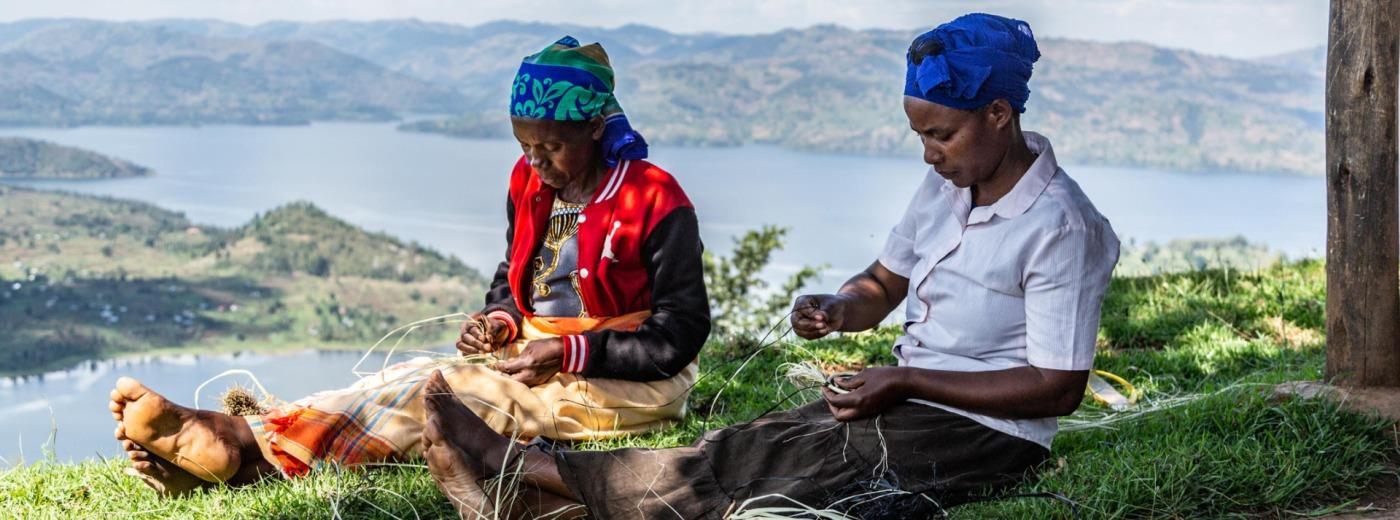All you need to know for your holiday to Rwanda
Visa Requirements
Latest Travel Updates
For up-to-date travel information from the UK government, please check:
UK Government Advice: www.gov.uk/foreign-travel-advice/rwanda
From 1st January 2018, nationals of all countries receive a visa on arrival at Kigali International Airport and all land borders.
Citizens of countries members to the following international organizations - African Union, Commonwealth and La Francophonie - get a visa upon arrival and are waived visa fees for a visit of 30 days.
A citizen of East African Community Member States shall be issued a pass/entry visa free of charge upon arrival to stay for the period of six months.
The following countries are granted 90 days valid visa free of charge upon arrival: Angola, Benin, Central African Republic, Chad, Cote d’Ivoire, Democratic Republic of Congo, The Federation of Saint Christopher and Nevis, Ghana, Guinea, Indonesia, Haiti, Mauritius, Philippines, Senegal, Seychelles, Sierra Leone, Sao Tome and Principe, Singapore and the state Qatar.
Any other passport holder must get a visa on arrival and pay a prescribed visa fee (by credit card or cash - if paying in cash please ensure you have the exact amount as no change can be given):
USD 50 single entry
USD 70 multiple entry
Your passport should be valid for a minimum period of 6 months from the date of entry into Rwanda and have sufficient blank pages for the Rwanda entry/exit stamps (at least 2).
Please note: We do NOT advise getting the East Africa Tourist Visa if your trip also includes Uganda and/or Kenya as this can cause problems at point of entry.
Leaving Rwanda - Marburg Virus Disease (MVD) screening. All travellers departing Rwanda are asked to complete a symptom-screening questionnaire within 24 hours in advance of exiting the country, available via a QR code at Kigali international airport.
Travellers through the airport should expect routine temperature checks using thermo-scan cameras and to use hand sanitising stations where available.IMPORTANT: Plastic bags are banned in Rwanda. Arriving visitors are requested to avoid bring plastic bags into the country - this includes in suitcases and carry-on hand luggage.
Please check hand luggage before disembarking and any plastic bags (including plastic duty-free shopping bags and the transparent plastic bags that some airlines require passengers to use for keeping liquids, cosmetics, etc) should be left in the plane.
Ziploc bags that are specifically used to carry toiletries will be permitted as they are expected to remain in the permanent possession of visitors and are not expected to be disposed in the country.
PLEASE NOTE: Countries can change their entry requirements at any time. Travel Butlers try to ensure that the information displayed here is correct, but the onus remains with the traveller to verify the information with the relevant High Commission or Embassy and ensure that they can comply with the applicable entry requirements.
Medical Considerations
You are advised to contact your doctor or clinic around 4-8 weeks before your trip to check whether you need any vaccinations and to get their professional medical advice regarding travel to Rwanda.
To help prevent diarrhoea, avoid tap water – drink only bottled water and use bottled water for tooth brushing, and avoid ice made with tap water – and only eat fruit or vegetables that are cooked or can be peeled. To help avoid heatstroke, drink plenty of bottled water/fluids, and keep out of the midday sun.
There is very low risk of contracting yellow fever in Rwanda. Your country of origin and other African countries including South Africa and Tanzania can deny entry without the yellow fever vaccination/certification, after having visited a country with any risk of yellow fever. If your doctor advises that it is not safe for you to have the vaccination then you should obtain a medical waiver and travel with that document instead.
There is a risk of malaria in all areas of Rwanda - check with your doctor about suitable antimalarial tablets. Try to avoid mosquito bites wherever possible - wear loose long-sleeved clothing and trousers, and use a repellent on clothing and exposed skin.
According to Rwandan law, any person on Rwandan territory must have health insurance. If you need emergency medical assistance during your trip, dial 112 and ask for an ambulance. You should contact your insurance/medical assistance company promptly if you are referred to a medical facility for treatment. Only limited medical facilities are available in Rwanda. In the event of serious accident or illness evacuation by air ambulance to Kenya or South Africa may be required. Make sure you have adequate travel health insurance and accessible funds to cover the cost of any medical treatment abroad and repatriation.
Mountain gorillas and chimpanzees are highly susceptible to human diseases including flu and colds. If you are participating in a gorilla/chimp trek then you need to be free of any visibly contagious diseases and this is checked at the start of the trek by the Park Authorities. If they are in any doubt of your condition, they reserve the right to prevent you from continuing on the trek. Our advice is that if you feel you are worried about this aspect, please inform your safari guide as soon as possible, and he will seek advice as to the best way to manage the situation. PLEASE NOTE: FACE MASKS ARE MANDATORY WHEN VISITING THE GORILLAS.
Marburg virus disease (MVD) The Rwandan Ministry of Health has issued a public update that Marburg virus disease has been confirmed in health facilities in the country. We understand it is present in hospitals in Kigali. Investigations are being carried out to determine the origin of the infection.
The Rwandan Ministry of Health has issued advice on avoiding close contact with symptomatic people, practicing enhanced hygiene measures, and the symptoms of Marburg virus disease to look out for.
To prevent the spread of MVD, all travellers departing Rwanda are asked to complete a symptom-screening questionnaire in advance of exiting the country. See Entry requirements for details. Latest updates from the Rwandan Ministry of Health can be found on X - @RwandaHealth
language and people
The official languages are Kinyarwanda, French, English and Kiswahili.
We would ask that all travellers are respectful of the local culture as follows:
Photography of government buildings is prohibited.
The week following Genocide Memorial Day on 7 April is designated an official week of mourning.
The last Saturday of each month is Umuganda, which is a national day of community service, during which most normal services close down from 07:00 to 11:00. The first and third Sunday of the month, the city of Kigali has a car free morning from 07:00 to 10:00 to promote exercise healthy living and to reduce car emissions. Other districts in the country have followed suit in the two consecutive Sundays.
Homosexuality is not illegal in Rwanda but remains frowned on by many. Whilst everyone is of course entitled to their own sexual preferences and gender identity, we would advise all clients (and this includes members of the LGBT+ community as well as members of the heterosexual community) to refrain from overtly public displays of affection which may cause offence to some local citizens.
currency
The currency is the Rwanda Franc.
US Dollars cash is the preferred option to bring when travelling to Rwanda. Once in Rwanda, we advise guests to change some dollars into local currency for use as spending money on the road eg for drinks, curios. We suggest a combination of small denomination notes (USD 1, 5, 10, 50) as well as USD 100 bills - make sure they are POST 2005 as generally only post 2005 series are accepted in Rwanda and have the ‘large heads’ on (the older notes depict the various senators with ‘smaller heads’ - this may sound a bit cryptic, but when you compare the notes it will become clearer). Note that whilst more convenient in terms of changing currency and not having to carry around huge amounts of local money, there is normally a surcharge on the smaller notes when changing them. Keep your slips, you are able to change surplus local money back to cash if you have proof of purchase when leaving the country.
Travellers cheques are difficult to change and REALLY bad rates of exchange generally apply, and are often VERY difficult to cash, even in large towns and especially over weekends and after hours. Throughout the rest of the country, changing TC’s is almost impossible.
There are only a few banks that are authorised to give cash advances on credit cards. Visa cards are generally fine BUT Mastercard are NOT guaranteed and will only be cashed IF they clear certain internal security checks. There is a limit on amounts that may be drawn, and only during banking hours. Exchange rates will be poor, and they may also charge a hefty service fee. The long and short is keep your credit card for EMERGENCIES ONLY.
ATM machines are often not working. They pay LOCAL MONEY only and you need an international use PIN code to draw money and it can only be done with certain cards.
Payment for services by credit card can only be done by VISA card or MASTERCARD in some places. Only large hotels generally accept this means of payment and they will also levy a fee of at least 5% on top of any bills.
climate
You can read more about the climate in our guide to the best time to visit Rwanda.
phone coverage
The international dialling code for Rwanda is +250.
electricity
240 volts but using 2 pin Europearn style plugs.
Some lodges and camps have power only at certain times of the day, and in some charging facilities are centralised. You will need your own charger.
In lodges/camps utilising solar power systems, the amount of power available for charging often depends on how sunny the weather has been and how busy the lodge is with charging equipment, so whilst they will always try to assist, continuous charging cannot be guaranteed at all times to be available.
Use of specialized breathing machines, hair dryers, curling tongs, shavers and other electrical equipment is possible at hotels in towns and at lodges with large generator power back up systems but generally not possible at solar powered lodges.
time zone
Rwanda Standard Time is 2 hours ahead of Greenwich Mean Time (GMT+2)
Driving
We do not recommend people hire a car and drive themselves in Rwanda, therefore all our holidays will be with a transfer where necessary.
While travelling through Rwanda, you will be mostly on tarred roads and they are in reasonably good condition by African standards. There may be some VERY LONG days in the vehicle, but the interesting and diverse scenery generally makes up for it! There are however, some really bad sections of dirt road, especially in the more mountainous areas. In these areas travel will be slower, quite bumpy and there could be a lot of dust experienced en-route.
The safari vehicles you will be travelling in are customised 4x4 vehicles (mainly Toyota LandCruisers) which have been converted for local conditions - they seat between 4-7 people, depending on the seating configuration and have opening roof hatches for optimal game viewing. They are a little slower on the road than a saloon vehicle or a smaller 'family' 4x4 and do not have air conditioning. Your safari vehicle is generally used throughout the safari for travelling between destinations as well as for game drives and other activities at the lodges and within the National Parks.

